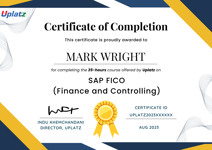
Chief Strategy Officer (CSO) Premium Career Track
Program consisting of courses to help you fulfil your dream of becoming a C-Level Executive (CSO) in a top organization
Uplatz
Summary
- Uplatz Certificate of Completion - Free
Add to basket or enquire
Overview
Uplatz provides this intense Premium Career Track program on Chief Strategy Officer (CSO). It is a program covering all topics related to Strategy, as self-paced video lectures. The program will help you pursue a career towards becoming a CSO. You will be awarded Course Completion Certificate at the end of the course.
This Premium Career Track - Chief Strategy Officer (CSO) program by Uplatz includes the following courses:
- Business Finance & Financial Modeling
- Financial Accounting & Reporting
- Leadership and Management
- Product Management
- Project Management Fundamentals
- SAP BPC (Business Planning and Consolidation)
- Fundamentals of Digital Marketing
- Business Intelligence and Data Analytics
- Microsoft Excel
- SAP GRC (Governance, Risk, and Compliance)
The CSO, or chief strategist, is the executive in charge of a company's strategic objectives, including their formulation, communication, and implementation. In other words, you'll collaborate with your CEO to develop a long-term business plan that will ensure your company's long-term prosperity.The Advanced CSO Professional Training is a difficult training programme that takes a holistic approach to strategy making. Our interactive approach focused on both strategic and operational elements of business will benefit experienced professionals in this course.
What is a Chief Strategy Officer?
CSOs – sometimes known as Chief Strategists – or indeed VPs of Strategy, VPs of Strategic Development, Strategy Directors etc, are c-suite, or leadership team executives who’s focus is squarely on the company or corporate strategy. They are leaders at the highest level of an organization, typically reporting into the CEO, whose primary responsibility is to spearhead the successful formulation, communication and execution of the business’ strategy.
A chief strategy officer (CSO) is an executive, that usually reports to the CEO, and has primary responsibility for strategy formulation and management, including developing the corporate vision and strategy, overseeing strategic planning, and leading strategic initiatives, including M&A, transformation, partnerships, and cost reduction. Some companies give the title of Chief Strategist or Chief Business Officer to its senior executives who are holding the top strategy role.
The need for a CSO position may be attributed to CEOs having less time to devote to strategy and/or to CEO's with less experience with developing strategy (e.g., many start up CEOs) along with uncertain and increasingly complex global environments. All of these factors increase the need for professional strategy development.
Chief Strategy Officers (CSOs) face a number of challenges distinct from those faced by other members of the C-Suite—in particular, the breadth and ambiguity of the CSO’s role.
The six faces of the CSO:
The advisor—helping shape the strategy
The sentinel—sensing and interpreting market shifts
The banker—driving deals and partnerships
The engineer—designing and running the strategic planning process
The aide de camp—the CEO’s unofficial chief of staff
The special project's leader—tackling miscellaneous high-impact initiatives
Course media
Description
Our skill-building and hands-on approach helps participants enhance their talents and successfully implement real life solutions across their business. Participants will learn how to take a holistic approach to CSO and CSR issues, trends, challenges, standards, and strategies, as well as gain insight into the best practises for leading organisational sustainability to overcome business uncertainty and gain a long-term competitive advantage.
What are the key areas of responsibility for CSOs?
Simply put, a CSO is responsible for developing, communicating and executing the company strategy. But of course, there is nothing simple about achieving all of that.
To be more specific, the responsibilities and objectives of a Chief Strategy Officer typically involve the following…
Formulate the strategy for the business
It is the job of the CSO to work with the CEO, leadership team and board of directors to develop the vision and strategy for the organization. It is the job of the CSO to produce a comprehensive strategic plan to facilitate its execution.
Communicate the strategy
Once the strategy has been developed, the CSO must ensure proper communication across the business to ensure all stakeholders – especially those who will be important to the execution – know the strategy and strategic priorities. They must also ensure that the plan is communicated clearly so everyone understands and remembers the strategy.
Secure buy-in
It’s not enough to just communicate the strategy to people so they know and understand it, a successful CSO will also ensure people in the business believe in it too. Winning buy-in for the strategy is important to the execution and the CSO will need to enthuse the teams, demonstrate the importance and promote a motivating vision for the future. They must secure people’s willing commitment to the strategic plan.
Maintain momentum
Once the execution has begun, the CSO will be responsible for the ongoing communication of the strategy to keep the plan front and center in everyone’s minds. They will have to undertake careful tracking of progress and identify any risks that could slow results. They must ensure strategic tasks are being prioritized correctly and there’s ownership and accountability to drive progress.
Observe and respond to market changes
The CSO must critically analyze the market, competitor performance alongside the performance of their business, it’s product lines and market share. This knowledge must inform the ongoing development and refinement of the business strategy and influence strategic decision making.
Identify and manage new strategic opportunities
CSOs often drive and lead mergers and acquisitions, joint ventures and strategic partnerships. They look for possible opportunities and then manage them through once identified. In a similar vein, if their strategic plan calls for divestment or the selling of significant assets (possibly to fund new strategic opportunities for growth), they will oversee that process.
What are the benefits of having a CSO in your business?
Coherence and consistency
There are often problems when c-suite leaders who are responsible for particular areas of the business translate the strategy for their teams. Each senior leader, heading up their own division or function or business unit will inevitably inflect the strategy in line with their concerns and priorities. This disparity can open up execution gaps as priorities become slightly distorted.
The role of the CSO ensures one central executive who can monitor the dissemination of the strategy throughout the business and mitigate against any distortion. With a CSO, the CEO has one person who can drive the cascading of the strategy and the workings of the execution and reduce the risk of a collection of CxOs with different interpretations going in slightly different directions – because the further they go in those different directions, the bigger the gaps will become.
Impartial decision making
Another benefit of a CSO without any joint responsibilities for any other function, is the ability to make impartial strategic decisions. When they are not responsible themselves for a certain area of the business, they are abstracted enough to make unbiased decisions. They can objectively see where current problems exist and make tough decisions to bring about change and drive growth. Without being tethered to the BAU day-to-day they are also able to make strategic decisions free of the unconscious influence of ‘the way we do things’.
Move faster
CSOs focused exclusively on strategy are also able to move the company forward far faster than if strategy was the shared responsibility of other c-suites or department/division leaders who are already swamped in things to do. Finding space to step away from the BAU to think strategically without distractions is always a considerable barrier to strategy. It’s hard to remove yourself from the day-to-day in order to work ON the business and not IN the business. That barrier is removed when you have a CSO in your organization.
The role of the Chief Strategy Officer, or any top level strategy leader, is an exciting one. The responsibilities are considerable, but often do not come with direct control of resources.
Who is this course for?
Everyone
Requirements
Passion and determination to make it to the top of the corporate ladder!
Career path
- Chief Strategy Officer (CSO)
- Chief Executive Officer (CEO)
- Chief Risk Officer (CRO)
- Chief Marketing Officer (CMO)
- Chief Operating Officer (COO)
- Account Executive
- Business Development Officer
Questions and answers
Currently there are no Q&As for this course. Be the first to ask a question.
Certificates
Uplatz Certificate of Completion
Digital certificate - Included
Course Completion Certificate by Uplatz
Reviews
Currently there are no reviews for this course. Be the first to leave a review.
Legal information
This course is advertised on reed.co.uk by the Course Provider, whose terms and conditions apply. Purchases are made directly from the Course Provider, and as such, content and materials are supplied by the Course Provider directly. Reed is acting as agent and not reseller in relation to this course. Reed's only responsibility is to facilitate your payment for the course. It is your responsibility to review and agree to the Course Provider's terms and conditions and satisfy yourself as to the suitability of the course you intend to purchase. Reed will not have any responsibility for the content of the course and/or associated materials.



